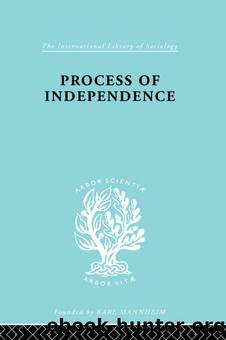Process Of Independence Ils 51 by Fatma Mansur

Author:Fatma Mansur [Mansur, Fatma]
Language: eng
Format: epub
ISBN: 9780415605434
Barnesnoble:
Publisher: Taylor & Francis
Published: 2015-08-14T00:00:00+00:00
SOME CONCLUSIONS
The preceding analysis may be used to throw some light on the process involved in the competition and replacement of élites, in what are essentially plural societies in a pre-industrial stage of development.
This last characteristic has as a consequence that the succession of ruling groups cannot be viewed in the light of the class theory as it is known in the West. It is true that some of the cleavages in these societies are cleavages along occupational and functional groups, but these cleavages are not primary cleavages. Rather, they reinforce older and deeper antagonisms. The communal massacres in India in 1947 are a case in point. The identification of the individual is with a group distinguished from other groups primarily by a different way of life and thought, not necessarily by a different way of earning a living. Hence we do not see a middle class struggling to wrest political leadership from an aristocracy, or a working class fighting a middle class. What we see is a multiplicity of minority élite groups trying to influence the élite belonging to the largest indigenous group, in order to survive as a cultural entity. The demand for separate electorates, for reserved seats, for federation, are means to ensure that cultural and other separatisms will survive. In the case where the minority group is very large and where it has a conception of itself not only as a separate group, but a separate nation, as is the situation of Pakistan, then partition is the result; in other words, the failure at composition. A geographical and cultural separatism such as the wide cleavage between the more Moslem Sumatra and the Hindu Java has for result an uneasy tug-of-war, unless an outside factor such as the Japanese occupation contributes to aid one group more than another. The point here is that the minority élite cannot truly compete with the majority élite because it is not acceptable to the majority section in psychological and emotional terms.
Over long periods of time, we do indeed witness a replacement of élites in the classical sense. Moghuls displace Mahrattas, and the British displace the Moghuls. Fulanis in the northern belt of West Africa displace the native Chiefs and Kings, and are in turn displaced by the British and the French. The Dutch displace the Portuguese who had displaced the Javanese kings.
This kind of circulation of élites involves élites coming from outside the indigenous society. It is not the result of changing patterns of social or economic relations inside the society, which is what we are primarily interested in here. In the relatively short periods of time under observation, we witness not so much a replacement of social groups as a replacement of one generation by another, the said generations belonging to the same social group, the pre-colonial ruling group, be it political or cultural. In this group we witness the âdemocratic tendencyâ of Mosca. The social upheaval created by the colonial impact, the new needs of the colonial society bring
Download
This site does not store any files on its server. We only index and link to content provided by other sites. Please contact the content providers to delete copyright contents if any and email us, we'll remove relevant links or contents immediately.
Collaborating with Parents for Early School Success : The Achieving-Behaving-Caring Program by Stephanie H. McConaughy; Pam Kay; Julie A. Welkowitz; Kim Hewitt; Martha D. Fitzgerald(897)
Entrepreneurship Education and Training: The Issue of Effectiveness by Colette Henry Frances Hill Claire Leitch(665)
Adding Value to Policy Analysis and Advice by Claudia Scott; Karen Baehler(499)
Materializing the Middle Passage by Jane Webster;(496)
Race and American Political Development by unknow(488)
Sociological Perspectives of Health and Illness by Constantinos N. Phellas(478)
American Government and Politics Today by Steffen W. Schmidt Mack C. Shelley Barbara A. Bardes(475)
Human and Global Security : An Exploration of Terms by Peter Stoett(461)
Control Of Oil - Hardback by Kayal(459)
The Disappearance of Rituals: A Topology of the Present by Byung-Chul Han(399)
Advances in Child Development and Behavior, Volume 37 by Patricia J. Bauer(396)
The Catholic Church and European State Formation, AD 1000-1500 by Jørgen Møller(388)
The World According to China by Elizabeth C. Economy(379)
Theories of Counseling and Psychotherapy: A Case Approach by Nancy L. Murdock(370)
Left Is Not Woke by Susan Neiman(367)
Application of classical statistics, logratio transformation and multifractal approaches to delineate geochemical anomalies in the Zarshuran gold district, NW Iran by unknow(362)
Turkey's Relations with the West and the Turkic Republics: The Rise and Fall of the Turkish Model by Idris Bal(353)
Cross-Cultural Child Development for Social Workers by Lena Robinson(348)
Japan's Ainu Minority in Tokyo by Mark K. Watson(331)
